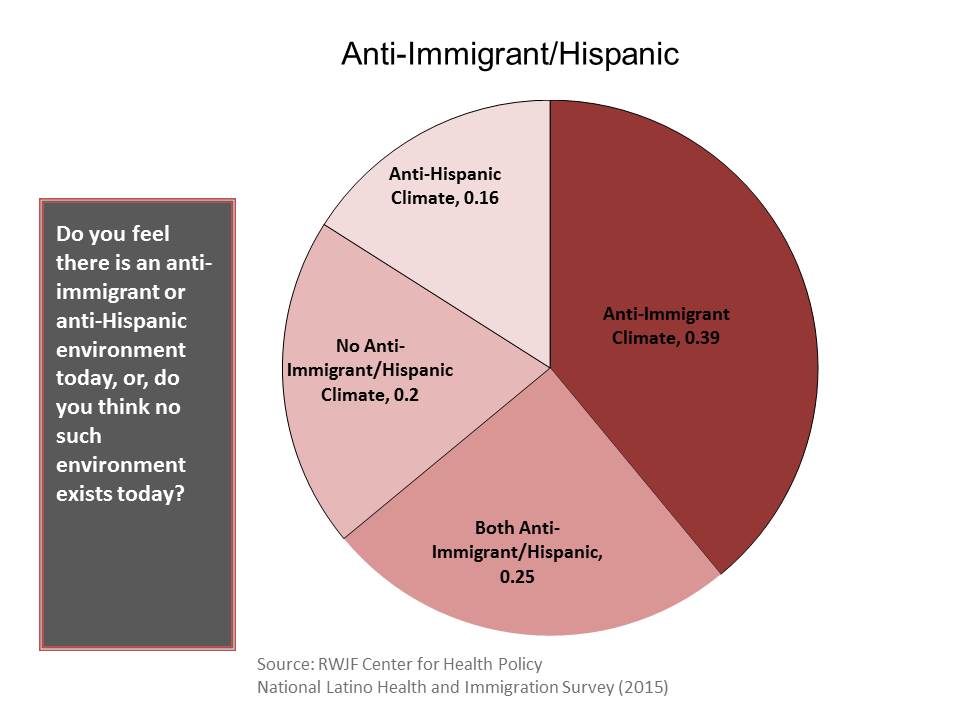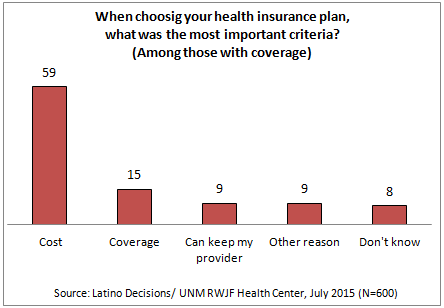A new poll of Latino/Hispanic adults in New Mexico funded by the National Institute of Health provides an opportunity to explore New Mexican Hispanics’ interactions with and attitudes toward health care reform.[1] The poll, commissioned by the Robert Wood Johnson Foundation Center for Health Policy (RWJF-CHP) along with NMCARES-Health Disparities Center, and administered by Latino Decisions, queried 600 Latino/Hispanic adults living in New Mexico regarding their knowledge of the new health care law, exposure to outreach efforts, perception of their own health care as impacted by the law, and their actual experience with the state’s exchange program. Although this is the first poll of this kind conducted in New Mexico, the findings from this study can be compared to results from the recent Latino National Immigration and Health Policy Survey (2015), another survey from the collaboration between the RWJF-CHP and Latino Decisions.
The Hispanic population in New Mexico is vital to the eventual success of the ACA in New Mexico due to the overall size, youthfulness of this population and their lower rates of health coverage. The Hispanic makes up a larger share of New Mexico’s overall population (approximately 47%) than the Latino segment of any other state’s population. Furthermore, Hispanics were much less likely to be insured than non-Hispanics before the implementation of the ACA (23% lacked insurance in 2013). These two factors alone make analysis of how the ACA is impacting the Hispanic population in New Mexico timely and highly relevant. However, when you add the fact that the median age for the Hispanic population in New Mexico is 29 years of age compared to 47 for non-Hispanic whites the importance of this data is magnified. The ACA relies heavily on the young and presumed healthy segments of the population to enroll in health insurance to control costs for the rest of the population. For these reasons, continued analysis of this data could be helpful in the continued effort to increase Hispanic access to health insurance in the state where the Hispanic population is most critical to the success of the reform law.
Hispanic Access to Health Insurance Improves in New Mexico Through the ACA
Results from our survey provide strong evidence that the ACA is working among New Mexican Hispanics. According to the survey, only 8% of Hispanic adults in New Mexico lack health insurance. Considering our margin of error of 4%, these findings are consistent with the results from a 2015 Gallup-Healthways Well-Being Index Survey that found the overall un-insured rate for all New Mexicans at 13%. This is a major improvement from the 23% uninsured rate for New Mexican Latinos estimated by the Kaiser Family Foundation in 2013 before the implementation of the reform law. However, our data also indicates that 19% of Hispanics in New Mexico lacked insurance for at least one month during the past year. This additional measure of partial coverage is important as a lapse in coverage for part of the year can be devastating to a family if a household member experiences a major health event while uninsured.
It is clear that the decision of Governor Martinez to expand Medicaid in New Mexico has had a tremendous impact on Hispanic access to insurance. Given the state’s high poverty rates and low levels of access to health insurance before the passage of the ACA, Medicaid expansion has led to New Mexico being one of the leaders nationally in reduction of uninsured population. Medicaid expansion has also led to a significant decrease in the disparity in access to insurance between the Hispanic and non-Hispanic white population in New Mexico. The magnitude of this policy change is reflected in Medicaid growing by 50.29% from July-September 2013 to January 2015. The expansion of Medicaid has not only greatly decreased the number of uninsured New Mexicans, but there is evidence that it has saved money within the Medicaid budget and in areas outside of Medicaid as well.
Are Latinos in New Mexico Utilizing the Exchange to Sign up for Insurance?
As part of the ACA rollout, the Obama Administration and the state of New Mexico deployed targeted outreach efforts, including the implementation of healthcare.gov in English and Spanish as well as commercials advertising the program in both languages. The survey assessed whether these efforts led the Hispanic community in New Mexico to utilize the exchange to enroll in insurance. The survey also examined the experiences of those who did access NMHIX, New Mexico’s health insurance exchange. The survey provides some of the best information available regarding interactions with the marketplace in New Mexico, which is critical to understanding the overall performance of the ACA in New Mexico and, specifically, the experiences of the state’s Latinos as they interface with the ACA.
We found that 16% of survey respondents utilized the Be Well New Mexico tools (website or telephone number) during the past year to get more information about the health insurance options available through the ACA. Among this segment of the sample, 32% of respondents indicated that they were able to enroll easily, with 31% indicating that they ran into problems that prevented them from enrolling. Another 33% reported that they did not enroll due to other reasons, including the cost of the plans or because they did not qualify. The survey also asked respondents who used the Be Well New Mexico tools to state what the most important criteria was for them when evaluating the health insurance plans available. Nearly 60% of this sub-sample indicated cost was the most important factor impacting their decisions compared to 15% who reported the coverage options of the plan and 9% who said it was being able to stay with their current provider. Finally, and reinforcing the salience of cost to New Mexico’s Hispanic population, the most commonly identified barrier to enrollment identified by those who attempted to utilize the exchange but did not enroll was that the insurance plans were “too expensive.”
Hispanic Knowledge Levels Suggest Need for Continued and More Hispanic Focused Outreach
A major theme of the study was to determine how informed Hispanics in New Mexico are about the ACA as well as how to best reach this population with information about the law and the exchange moving forward. Overall, the results from this poll indicate that there will need to be not only continued outreach to the Latino community regarding the reform law, but information that more precisely targets this population. Although the majority of respondents (57%) indicated that they are “informed” about the Affordable Care Act, only 16% believe that they are “well informed.” This is fewer than the 20% who feel they are “not at all” informed. More telling, when asked to identify which statement better represents how they feel about the ACA, 63% believe that the law is “confusing and complicated” compared to only 30% who feel “pretty well informed.”
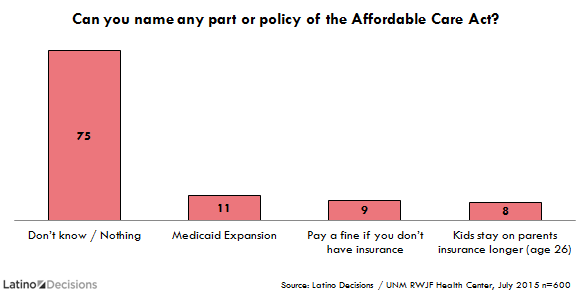
The survey asked respondents to identify any policy changes associated with the law. Responses could be open-ended. We believe that these responses provide the best indicator of knowledge of the ACA available in our data. As you can see in the figure below, 75% of the sample could not identify any specific policy related to the ACA. The ACA policies that were most recognized by New Mexican Hispanics were: 11% of respondents identified Medicaid expansion, 8% of respondents identified extension of children’s coverage on their parents’ plan to age 26, and 9% understood that there could be a fine for remaining un-insured.
Finally, the survey also asked New Mexico’s Hispanic population if they had heard or read anything about the health insurance marketplace, often referred to as Be Well New Mexico. While 32% of the sample indicated that they had heard “some” (23%) or a “great deal” (9%), the modal category for this question indicated that they had heard “nothing at all” at 39%, with another 28% stating they had heard “not that much.” This is similar to an item that asked respondents how much they had heard about the expansion of Medicaid in New Mexico, with 38% of respondents indicating that they had heard “some” (27%) or a “great deal” (11%) about Medicaid expansion. This compared to 61% who reported that they had heard “nothing at all” (34%) or “not that much” (27%) about Medicaid expansion.
The Survey Provides Guidance on How Best to Engage Latinos in New Mexico About the ACA
Latinos in New Mexico also vary in their preference of terminology used when referring to the new health care law, with 38% of English dominant Hispanics preferring the “Affordable Care Act,” 30% “Obamacare,” and 8% preferring “Healthcare Reform Program.” There is similar variation among Spanish speakers in New Mexico, as 20% prefer “Reforma de Cuidado de Salud” compared to 20% who prefer “Ley de Cuidado de la Salud.” Interestingly, the most popular term for Spanish speakers is “Obamacare,” with 30%, indicating that this term has traction for both English and Spanish speaking Latinos in New Mexico.
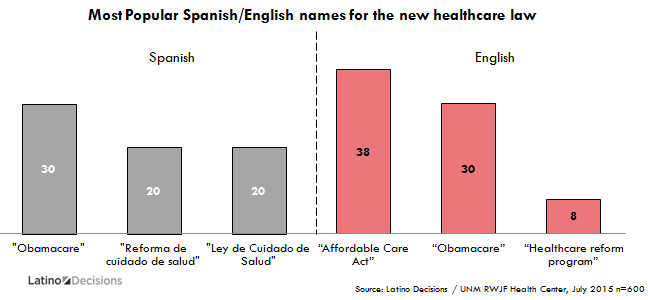
The survey also identified the individuals and organizations most trusted to deliver information about the ACA. The data indicates that the Latino community in New Mexico trusts “hospitals” (26%) and “doctors” (27%) as primary messengers; “health insurance companies” were identified by 17% of respondents and “neighborhood clinics” came in at 16%. Social networks will also be vital to outreach efforts, as 20% of respondents indicated that they trusted information received from “family” and “friends.” The survey also queried respondents about their preferred form of communication for information about the health care law. The most commonly identified forms of communication were “the Internet” with 32%, “Pamphlets and Mailers sent to your house” with 28%, and “Television” at 22%.
Perceptions of the ACA Among Latinos in New Mexico
Finally, we asked respondents to tell us whether they think their personal health care situation “will improve,” “stay the same,” or “get worse” under the ACA. As reflected in the figure below, we found that 73% of Latinos in the current survey believe their ability to “get and keep health insurance” will at least stay the same (46%) or get better (27%), This aligns with our primary finding that access to insurance has increased among Hispanics since 2013. When asked about the “quality of their health care,” 24% of Latinos think that quality will improve under the ACA, compared to 49% who said the quality of their care will stay the same. Reinforcing what we learned from other survey questions regarding the costs of insurance, more respondents indicate that the “cost of health care for their family” will actually get worse (38%) than those who think it will get better (24%), while 49% believe it will stay the same.
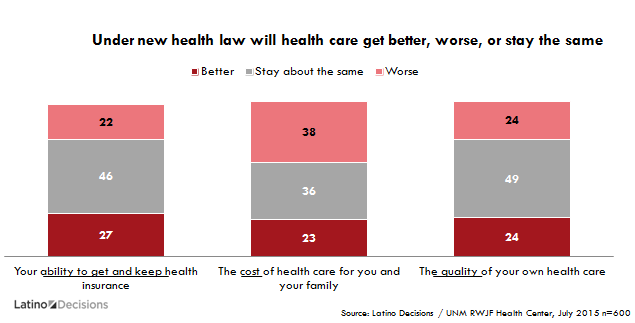
Although we have found strong evidence that the ACA is increasing access to health insurance for Hispanics in New Mexico, cost appears to remain the most salient issue or obstacle for Latinos in obtaining health care in the state. Our next brief will focus more exclusively on this topic by drawing from additional survey content focused on how the rising costs of health care is negatively impacting the Hispanic population in New Mexico.
Survey Methodology
Latino Decisions surveyed a representative sample of 600 Hispanic/Latino adults in New Mexico between June 23 and July 14, 2015. Respondents were reached on a combination of both landline and mobile phones (n=500) as well as through email (n=100). Surveys were implemented to randomly selected phone numbers, conducted via live, person-to-person (i.e. not robocalls) phone calls, and email addresses for the web sample. Interviews were conducted in English (82%) or Spanish (18%), according to the respondent’s choice. All interviewers were fully bilingual. The survey was informed by participants in two focus groups conducted prior to the implementation of the survey. The survey carries a margin of error of +/- 4 percentage points.
[1] Research reported in this publication was supported directly by the National Institute On Minority Health And Health Disparities of the Institutes of Health under Award Number P20MD009574. The content is solely the National responsibility of the authors and does not necessarily represent the official views of the National Institutes of Health.
Gabriel R. Sanchez is an associate professor of political science at the University of New Mexico, the executive director of the RWJF Center for Health Policy at UNM, and the director of research for Latino Decisions. Sam Howarth is a Senior Fellow of the RWJF Center for Health Policy at UNM. Maria Livaudais is a PhD Candidate in Political Science and a UNM Center for Health Policy at UNM.

